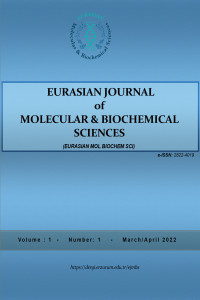Effect of Bortezomib administration on autophagic cell death in colorectal cancer cells
Effect of Bortezomib administration on autophagic cell death in colorectal cancer cells
Colon cancer is the most common cancer type after breast and prostate cancer in humans. Bortezomib is a proteasome inhibitor
and is commonly preferred for the treatment of some types of cancer due to its efficiency and lower side effects. This study has
investigated the impact of Bortezomib on cell death regarding the stimulation of autophagy. Bortezomib (Velcade) was treated
to colorectal cancer cells (HT-29) for 24 hours at different concentrations (10 nM, 20 nM, and 40 nM). MTT analysis was used
to determine the viability of Bortezomib-treated HT-29 cells, and immunocytochemical methods were used to determine
bortezomib’s effects on the expression of Beclin-1 and LC3 levels in the HT-29 cells. In MTT analysis, viability was decreased
with an increase in bortezomib concentration and the lowest viability was found at 40 nM concentration. In the study, Beclin-
1 immune reactive cells were seen as higher in 10nM and 40 nM concentrations of Bortezomib than other groups. Additionally,
in LC3 evaluation, the immune reactive cell density was the highest at 40 nM concentration of Bortezomib (p
Keywords:
Cancer, Autophagy Bortezomib, Beclin-1, LC3.,
___
- 1
- Başlangıç: 2022
- Yayıncı: Erzurum Teknik Üniversitesi
Sayıdaki Diğer Makaleler
The potential role of long non-coding RNAs and micro RNAs in insects: From junk to luxury
Insha SHAFİ, Mudasir GANİ, Sadiah SHAFİ, Taskeena HASSAN, Mohd. Ayoub MANTOO, Kamlesh BALİ, Rakesh Kumar GUPTA
Cihan GÜR, Seçkin ÖZKANLAR, Semin GEDİKLİ, Emin ŞENGÜL, Volkan GELEN, Adem KARA
Effect of Bortezomib administration on autophagic cell death in colorectal cancer cells
Elif ERBAŞ, Nevra AYDEMİR CELEP, Kader ÇİFTÇİ
Investigation of the effects of different genotypes on regeneration capacity in Triticale
İsmail BEZİRGANOGLU, Serap KARAMAN, Beyza REİSOĞLU, Fatma BÖKE, Büşra YAZICILAR
Şimal TOPÇU, Elif ARSLAN, Şeymanur ÇOBANOĞLU, Ayşenur YAZICI, Ümit İNCEKARA
